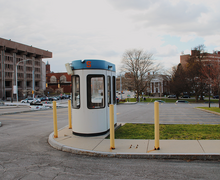Prospective students share public policy plans in scholarship contest
Approximately 105 prospective Syracuse University students presented public policies to improve their local communities as part of the 63rd Annual Maxwell Citizenship Scholarship Conference at Schine Student Center Saturday afternoon.
The conference, which started in 1946 and is sponsored by the public affairs program in the Maxwell School of Citizenship and Public Affairs, announces a winner each year who receives $5,000 in scholarship money for each of his or her four years at SU. In 1977, the program was taken over and revamped by William Coplin, Maxwell’s current public affairs chairman.
Coplin said the inspiration and purpose of the program is to, ‘further the mission of the Maxwell school and promote public service and citizenship.’
The winner is determined by a combination of essay and group discussion scores. To apply, students send in an essay in which they propose a public policy to improve their local community.
‘The finalists come Saturday to participate in small group exercises,’ Coplin said. ‘They then argue and rate each other. The scholarship results from the essay score, which I graded, and the peer group score, which are determined by their peers.’
The winner of the scholarship this year was Andrew Swab from Massachusetts. He proposed to have his school district use solar panels to cut energy costs.
In contrast to years past, Coplin explained, new entities were added to the program this year. ‘I invited every admitted student to send in policy memo and selected those most reasonable as finalists,’ Coplin said.
Coplin described some of the more intriguing and practical policies he has seen students propose over the years.
‘The key is for the student to define something in their society and come up with a reasonable solution,’ he said. One student proposed to put more Automated External Defibrillators (AEDs) in their local hospital and actually went to the local town board to recommend it, Coplin said. There have also been many ways to fix schools and safeguard school cafeterias from diseases like E. coli.
Zach Kravat, a prospective student from Long Island, offered a strategy that would completely reform property taxes in his community. ‘My policy would update market values and cap property taxes based on income,’ he said.
Kendyl Bressant, from Harford County, Md., outlined a plan to combat the sizeable amount of gang violence in her county.
Haley Lesavoy from Allentown, Penn., who plans to major in broadcast journalism, lives in a county that has not yet banned smoking. She put forward a plan to outlaw smoking in indoor public places.
All three of those students felt relieved at the overall process of the conference Saturday, especially the peer discussion. ‘It wasn’t as intense as I imagined it was going to be,’ Lesavoy said.
Both Kravat and Bressant described the process as relaxed and generally friendly, with many good ideas coming to the surface.
Winning and even competing in the conference has led to much success for students. Coplin even told of one past participant who was inspired to choose her profession because of her policy proposal. ‘I recently received a letter from the girl that won in 1985 who just became a district attorney. Her experience at the conference and interest in her policy got her started on the idea of being district attorney.’
The participants of the conference can also be placed in the Maxwell learning community, Coplin said.
‘The learning community is made up of great people and good friends who I intend to keep in touch with for my four years here and beyond,’ said Zach Lax, a freshman in the College of Arts and Sciences and last year’s winner.
Another participant in last year’s conference, Justin Cole, a freshman in the College of Arts and Sciences, said, the learning community is a great opportunity to meet new people.
‘It really opened my eyes to a lot of new things,’ he said.
Besides giving prospective students the chance to compete, the Maxwell Scholarship Conference is important for the Maxwell school, its students and its faculty.
‘We are here to continue the tradition of the conference and of the Maxwell school and to do good deeds,’ Coplin said.
Published on April 20, 2008 at 12:00 pm





